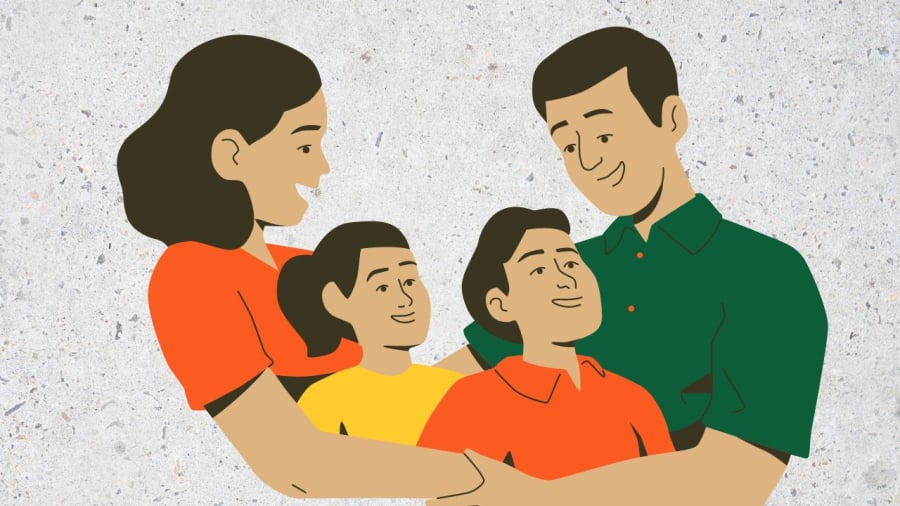Parents, Don’t Overindulge Your Children
Love your children, but avoid spoiling them. Overindulgence makes children dependent on their parents, hindering their self-reliance. Studies show that resilient children bounce back from setbacks more confidently and take calculated risks with greater preparation. Note the distinction from harshness. Parents should set reasonable expectations and let children take on age-appropriate responsibilities. That’s the advice of bestselling author and parenting expert Esther Wojcicki.
Wojcicki says parents can help their children develop initiative and self-motivation by giving them ownership over everyday activities, such as chores or choosing their own after-school activities.
“The more parents trust their kids to handle things, the more empowered the kids become,” writes Wojcicki.

Parents should love but not spoil their children
Don’t Punish Children for Mistakes
Punishing children for making mistakes isn’t always a good lesson. According to American psychotherapist Amy Morin, punishing children for their mistakes sends the message that failure is shameful, not a temporary setback from which one can learn.
So when children make a mistake, point out the mistake and show them how to correct it, emphasizing that asking for help or correcting a mistake is praiseworthy behavior that will help them confidently overcome challenges in the future. Parents can share stories about how they made mistakes and overcame them. Or, parents can buy books about failure and resilience for their children to read.
Avoid Negativity
Parents who are always complaining or pessimistic can make their children fearful and fatigued. “Optimistic children see setbacks as temporary,” says Michele Borba, an educational psychologist and parenting expert, to CNBC. So avoid conveying negative emotions to your children. When you’re optimistic, you’re teaching your children optimism and, thus, giving them a better outlook on life. When something upsetting happens to your child, you can say, “It’s okay. I’m here for you,” instead of sighing and lamenting about your child’s misfortune.
Don’t Get Annoyed When Your Children Ask Many Questions
Young children are naturally curious and inquisitive; the more they ask, the more actively their brains are working. So don’t get annoyed when they ask many questions. Research shows that children learn more and retain what they learn when they’re actively curious.
Good parents prioritize their children’s exploration and learning experiences, understanding the importance of nurturing curiosity and answering questions.
Don’t Overreact to Your Children’s Issues
It’s easy for parents to feel anxious about their children’s lives, worrying about their academic performance, eating habits, or friendships. But when parents are overly concerned about everything that goes on in their children’s lives, it makes the children anxious, too, and they may adopt that anxious behavior. Parental anxiety can negatively impact children’s mental health, potentially contributing to conditions like depression, hopelessness, and other issues.
When children see their parents overreacting to their concerns, they can feel guilty and ashamed, leading them to suppress their emotions.
In sum, raising children requires effort, but the process will be much smoother if parents can avoid making certain parenting mistakes.
Parents should set reasonable expectations and allow children to take on age-appropriate responsibilities. Giving children ownership over everyday activities, such as chores or choosing their after-school activities, helps develop their initiative and self-motivation. It’s important to strike a balance between love and discipline to ensure children grow up with a sense of self-reliance and resilience.
Punishing children for mistakes is not recommended. Instead, parents should view mistakes as learning opportunities. By pointing out the mistake and teaching children how to correct it, parents can emphasize that asking for help and learning from mistakes is praiseworthy behavior. This approach helps children develop a growth mindset and builds their confidence to face future challenges.
Parents who maintain a positive and optimistic attitude teach their children to do the same. It’s important to avoid conveying negative emotions, complaints, or pessimism to children, as it can make them fearful and fatigued. Optimistic children view setbacks as temporary and are more resilient. Parents can help their children develop a healthy outlook on life by modeling optimism and providing reassurance during difficult times.
Parents should encourage their children’s natural curiosity and prioritize their exploration and learning experiences. It’s important not to get annoyed by children’s questions but to view them as a sign of active learning and engagement. Research shows that children retain more when they are curious and actively involved in the learning process. Nurturing curiosity and providing thoughtful answers helps foster a love of learning.
It’s natural for parents to feel anxious about their children’s lives, but it’s important to avoid overreacting to every concern. Parental anxiety can negatively impact children’s mental health and lead to feelings of guilt and shame. Instead, parents should strive to provide a calm and supportive environment, helping children develop healthy coping mechanisms and emotional intelligence.
Small Actions, Big Impact: Parents’ Influence on Children’s Success and Promising Future
How Parents’ Common Sayings Ruin Children’s Future but Many People Still Fall for It
 Children’s Future but Many People Still Fall for It’>
Children’s Future but Many People Still Fall for It’>Adults often underestimate how much children understand and remember. The truth is, hurtful words can stick with a child and have long-lasting effects.


































